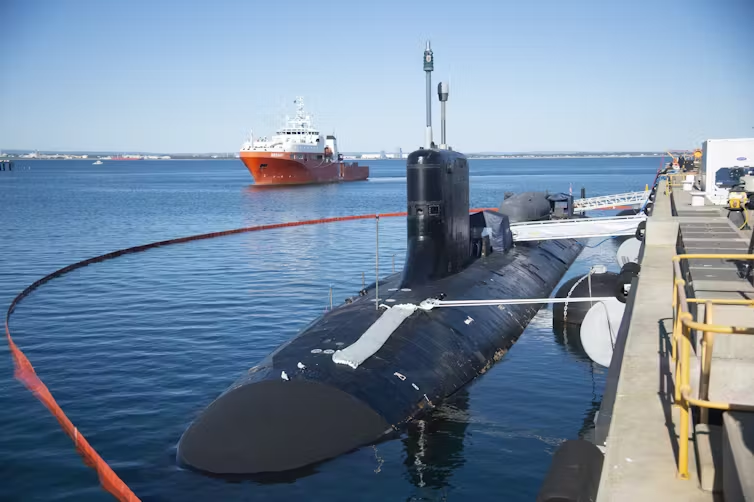Pentagon’s AUKUS Review Raises Strategic Concerns in Australia
The Pentagon’s decision to review the landmark AUKUS agreement—a trilateral security pact between the United States, the United Kingdom, and Australia—has sparked anxiety in strategic circles. While the review is being positioned as part of Donald Trump’s “America First” policy framework, the reality is far more complex.
Elbridge Colby Brings Hardline Strategy to AUKUS Review
Elbridge Colby, the U.S. undersecretary of defense for policy, will reportedly oversee the review. He’s known for his hawkish views on China and his belief that the U.S. must be prepared to win a war it cannot afford to lose. This worldview gives important context to the AUKUS evaluation.
Routine Reviews Shouldn’t Alarm—But Stakes Are High
Despite raised eyebrows in Australia, reviewing defense policies is standard practice for incoming governments. The UK has also launched a similar inquiry, reinforcing that the U.S. is not acting in isolation.
What heightens concern is Australia’s substantial stake in AUKUS. As a core partner, its role in regional stability and submarine capability is integral to the alliance’s long-term goals. This makes the review a high-stakes moment for Canberra.
Colby Questions U.S. Industrial Capacity for Submarine Support
Colby’s past writings and public statements highlight a deeply strategic, deterrence-based approach. He advocates for military preparedness, especially against potential Chinese aggression, and has praised the U.S.-Australia alliance multiple times.
While he identifies as an “AUKUS agnostic,” Colby has serious concerns about submarine manufacturing capacity. The U.S. industrial base is already stretched, and there’s fear that redirecting assets to Australia could weaken U.S. naval readiness.
Australia’s Commitment to AUKUS Production Deepens
However, Australia is stepping up. A nearly A$800 million (US$500 million) payment was made to expand U.S. industrial capacity, and Australian companies are contributing to the production of critical components for the submarines.
Joint legislative and industrial reforms across all three nations are also helping streamline submarine manufacturing. These moves aim to ease bottlenecks and accelerate production timelines—a process already showing early signs of success.
AUKUS Facing Normal Project Challenges—But Momentum is Real
Despite progress, large-scale projects like this often face delays and setbacks. Yet indicators suggest the AUKUS initiative is gaining traction, and delivery schedules are likely to improve over the next 12 to 18 months.
There’s widespread optimism that even under a second Trump administration, the AUKUS deal will remain intact. The rationale is clear:
The project is already well underway.
Over 100 Australian sailors are embedded in the U.S. naval ecosystem.
Australia is now contributing industrially in a substantial way.
Perth Submarine Base Holds Strategic Weight in Indo-Pacific
One key strategic asset is the submarine base near Perth. Its geographic location makes it critical for U.S. operations in the Indian Ocean, particularly in countering China’s influence in the region.
Submarines launched from this base can influence China’s Malacca dilemma—its vulnerable reliance on trade routes through the Malacca Strait. Maintaining this pressure point provides a deterrent edge to U.S. and allied forces.
Deterrence Strategy Hinges on Australia’s Continued Role
The consensus in defense circles is to preserve the status quo and avoid open conflict over Taiwan. AUKUS helps bolster deterrence, and Australia’s continued support is pivotal to this strategy.
Speculation is mounting that Trump could use the review as leverage—possibly to slow down deliveries or press Australia to increase its defense spending. Canberra may find such a request aligned with its long-term interests.
Transactional Politics Likely, But Alliance Remains Solid
Trump’s administration is known for transactional diplomacy. Yet this isn’t entirely new—previous U.S. governments have also made strategic demands in return for alliances and cooperation.
In this light, any renegotiation or “deal-making” around AUKUS should not be viewed with alarm. Rather, it’s business as usual in international politics, particularly when dealing with an unpredictable but pragmatic administration.
There’s little evidence to suggest that Trump would want to dismantle a vital strategic pact with one of America’s most loyal allies. Australia has stood beside the U.S. since Federation—abandoning that legacy seems highly unlikely.
Why Australia Can’t Afford to Step Away from AUKUS
Still, critics may argue that this is the right moment for Australia to reconsider AUKUS. However, without this partnership, what alternative would ensure national security amid increasing global instability?
With rising great power competition, walking away now would be a mistake. It would leave Australia exposed at a time when alliances matter more than ever. Strategic patience and continued investment are far more beneficial than retreat.






